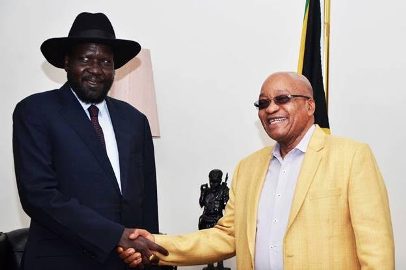South Sudan president extends South Africa visit
October 25, 2015 (JUBA) – South Sudanese president, Salva Kiir, has extended his initial announced two-day official visit to South Africa for bilateral talks with his host counterpart, president Jacob Zuma, amid allegations pointing to his health concerns as the cause for the extension of the visit in order to receive medical treatment.

According to presidential spokesperson, Ateny Wek Ateny, president Kiir was visiting Pretoria to brief the host president on the progress made in the implementation of the peace agreement and reunification of the three factions of the ruling Sudan People’s Liberation Movement (SPLM) which split into three separate groups in 2013 after internal debates about democratic reforms turned violent.
The head of state left Juba on Friday and arrived South Africa at night. It was not clear who initiated the visit between Juba and Pretoria. The president however reportedly met the South African president, Zuma, at the State House in Pretoria, on Saturday.
Officials close to the presidential visit however revealed that president Kiir was visibly appearing sick when he met president Zuma, but said there was no need for concern over the extension, revealing that the president was seeking medical check-up and some rest before he could return to the country.
“There is no indication to us that our people should worry about the health of the president. The president is well but I think he needs a rest,” a source accompanying the president said Sunday.
“He started struggling to reach South African president on arrival at the state house for greeting,” he told Sudan Tribune on condition of anonymity for fear of reprisal.
Accompanied on the trip by foreign affairs and international cooperation minister, Barnaba Marial Benjamin, and minister in the office of the president, Awan Guol Riak, president Kiir reportedly discussed with president Zuma issues relating to the August peace agreement he signed with Riek Machar, former vice president, as well as on the SPLM reunification process.
Other officials accompanying the president however attributed the extension of the visit to the need to interact with as many government and business officials as possible over how best they could help him and his administration address economic challenges surrounding the implementation of the peace accord.
Concerns about the state of president Kiir’s health last year led some members of his government and family members to suggest that he may decide to step down and allow defence minister, Kuol Manyang Juuk, to take over from him.
Kiir made public appearance in September to address the nation on the implementation of the peace agreement after failing to appear in a public rally he was expected to address earlier. No satisfactory and convincing reasons were provided behind the failure to address the gathering, although information and broadcasting minister, Michael Makuei Lueth, attributed the cause to other commitments.
The president on 2 October appeared on the national television to personally announce an order expanding the current constitutionally recognized 10 states to 28 states. He looked frail and appeared to have lost weight. His walking seemed stiffer than usual when climbing the podium to announce the order and while leaving he needed assistance from an aide who was walking beside him.
In Addis Ababa, Ethiopian capital, in August while discussing final touches with his rival Machar, president Kiir collapsed and had nose bleed. He was taken to hospital and attended to by doctors who revealed stress and heavy drinking as similar cause at the time.
Social media on Saturday after meeting South African president were dominated by talks of how sickly and tired the president looked. Government officials, however, remarked that the 64-year-old looked well than what has been speculated in the media about his alleged deteriorating health condition.
But although presidential advisor on decentralization and intergovernmental linkages insisted that the president was never ill and in good health, a number of current and former associates of the president said his undisclosed health problem has been a concern for some time.
(ST)

